Related Research Articles

Sir Robert Peel, 2nd Baronet, was a British Conservative statesman who twice was Prime Minister of the United Kingdom, and simultaneously was Chancellor of the Exchequer (1834–1835). He previously was Home Secretary twice. He is regarded as the father of modern British policing, owing to his founding of the Metropolitan Police Service while he was Home Secretary. Peel was one of the founders of the modern Conservative Party.
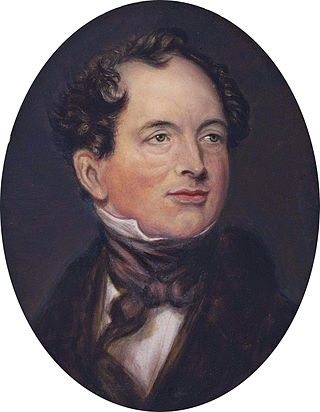
Thomas Moore, also known as Tom Moore, was an Irish writer, poet, and lyricist celebrated for his Irish Melodies. His setting of English-language verse to old Irish tunes marked the transition in popular Irish culture from Irish to English. Politically, Moore was recognised in England as a press, or "squib", writer for the aristocratic Whigs; in Ireland he was accounted a Catholic patriot.
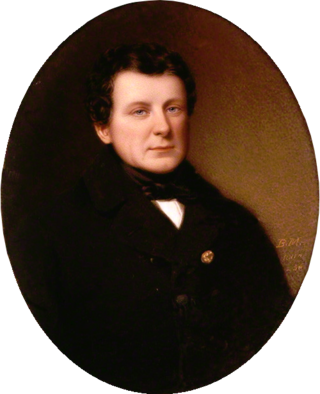
Daniel(I) O’Connell, hailed in his time as The Liberator, was the acknowledged political leader of Ireland's Roman Catholic majority in the first half of the 19th century. His mobilisation of Catholic Ireland, down to the poorest class of tenant farmers secured the final instalment of Catholic emancipation in 1829 and allowed him to take a seat in the United Kingdom Parliament to which he had been twice elected.
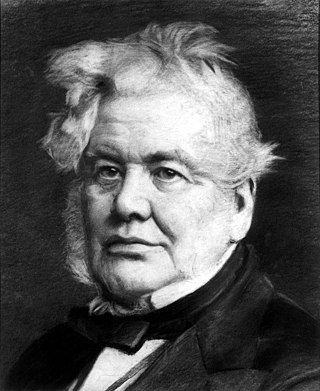
Isaac Butt was an Irish barrister, editor, politician, Member of Parliament in the House of Commons of the United Kingdom, economist and the founder and first leader of a number of Irish nationalist parties and organisations. He was a leader in the Irish Metropolitan Conservative Society in 1836, the Home Government Association in 1870, and the Home Rule League in 1873. Colin W. Reid argues that Home Rule was the mechanism Butt proposed to bind Ireland to Great Britain. It would end the ambiguities of the Act of Union of 1800. He portrayed a federalised United Kingdom, which would have weakened Irish exceptionalism within a broader British context. Butt was representative of a constructive national unionism. As an economist, he made significant contributions regarding the potential resource mobilisation and distribution aspects of protection, and analysed deficiencies in the Irish economy such as sparse employment, low productivity, and misallocation of land. He dissented from the established Ricardian theories and favoured some welfare state concepts. As editor he made the Dublin University Magazine a leading Irish journal of politics and literature.

Charles Wood, 1st Viscount Halifax, known as Sir Charles Wood, 3rd Baronet, between 1846 and 1866, was a British Whig politician and Member of the British Parliament. He served as Chancellor of the Exchequer from 1846 to 1852.

Thomas Spring Rice, 1st Baron Monteagle of Brandon, was a British Whig politician, who served as Chancellor of the Exchequer from 1835 to 1839.

Francis Blackburne PC (Ire) KS was an Irish judge and eventually became Lord Chancellor of Ireland.

George Hamilton Chichester, 3rd Marquess of Donegall, styled Viscount Chichester until 1799 and Earl of Belfast between 1799 and 1844, was an Anglo-Irish landowner, courtier and politician. He served as Vice-Chamberlain of the Household from 1830 to 1834, as well as from 1838 to 1841, and as Captain of the Yeomen of the Guard between 1848 and 1852. Ennobled in his own right in 1841, he was also Lord Lieutenant of Antrim from 1841 to 1883 and was made a Knight of St Patrick in 1857.
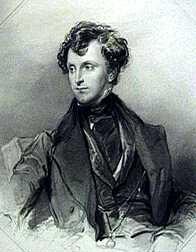
Sir James Emerson Tennent, 1st Baronet, FRS was a Conservative Member of the United Kingdom Parliament for the Irish seats of Belfast and of Lisburn, and a resident Colonial Secretary in Ceylon. Opposed to the restoration of a parliament in Dublin, his defence of Ireland's union with Great Britain emphasised what he conceived as the liberal virtues of British imperial administration. In Ceylon, his policies in support the growing plantation and wage economy met with peasant resistance in the Matale Rebellion of 1848. In recognition of his encyclopedic surveys of the colony, in 1862 he was elected a Fellow of the Royal Society.

Portrane or Portraine is a small seaside village located three kilometers from the town of Donabate in Fingal, County Dublin in Ireland. It is in the barony of Nethercross in the north of the county.
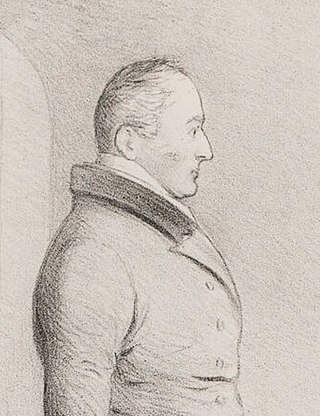
Henry Brooke Parnell, 1st Baron Congleton PC, known as Sir Henry Parnell, Bt, from 1812 to 1841, was an Irish writer and Whig politician. He was a member of the Whig administrations headed by Lord Grey and Lord Melbourne of the 1830s and also published works on financial and penal questions as well as on civil engineering. He was a grand-uncle to the Irish nationalist leader Charles Stewart Parnell.

The 1830 United Kingdom general election was triggered by the death of King George IV and produced the first parliament of the reign of his successor, King William IV. Fought in the aftermath of the Swing Riots, it saw electoral reform become a major election issue. Polling took place in July and August and the Tories won a plurality over the Whigs, but division among Tory MPs allowed Earl Grey to form an effective government and take the question of electoral reform to the country the following year.
County Cork was a parliamentary constituency in Ireland, represented in the Parliament of the United Kingdom from 1801 to 1885. It returned two Members of Parliament (MPs) to the House of Commons of the United Kingdom of Great Britain and Ireland.

Sir Joseph Napier, 1st Baronet was an Irish Conservative Party Member of Parliament (MP) in the United Kingdom Parliament. He was also a barrister and judge, who served briefly as Lord Chancellor of Ireland.
Valentine Brown Lawless, 2nd Baron Cloncurry, was an Irish peer, politician and landowner. In the 1790s he was an emissary in radical and reform circles in London for the Society of United Irishmen, and was twice detained on suspicion of sedition. He gained notoriety for his celebrated lawsuit for adultery against his former friend Sir John Piers, who had seduced Cloncurry's first wife, Elizabeth Georgiana Morgan. He took up residence at Lyons Hill, Ardclough, County Kildare and, commensurate with his status as an Anglo-Irish lord, appeared to reconcile to the Dublin authorities. Lawless served as a Viceregal advisor and eventually gained a British peerage, but it was not as an Ascendancy loyalist. He pressed the case for admitting Catholics to parliament and for ending the universal imposition of Church of Ireland tithes.
The Irish Conservative Party, often called the Irish Tories, was one of the dominant Irish political parties in Ireland in the 19th century. It was affiliated with the Conservative Party in Great Britain. Throughout much of the century it and the Irish Liberal Party were rivals for electoral dominance among Ireland's small electorate within the United Kingdom of Great Britain and Ireland, with parties such as the movements of Daniel O'Connell and later the Independent Irish Party relegated into third place. The Irish Conservatives became the principal element of the Irish Unionist Alliance following the alliance's foundation in 1891.
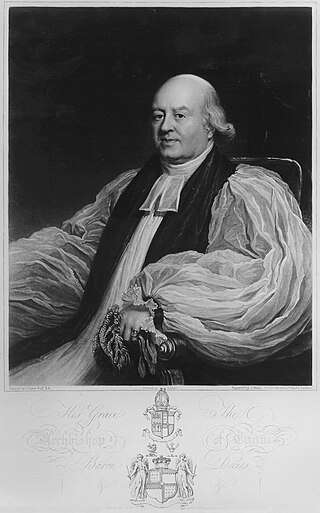
William Beresford, 1st Baron Decies was an Anglo-Irish clergyman.
George Evans, 1st Baron Carbery PC (Ire) was an Anglo-Irish politician and peer. A member of a County Limerick family of Whigs, he entered the Irish House of Commons and was created a peer in 1715 as a reward for his father's support of the Hanoverian succession, after his father declined the offer. At the same time, he was returned to the British House of Commons for Westbury. He contested control of the borough with the Tories led by the Earl of Abingdon until 1727, when he stood down.
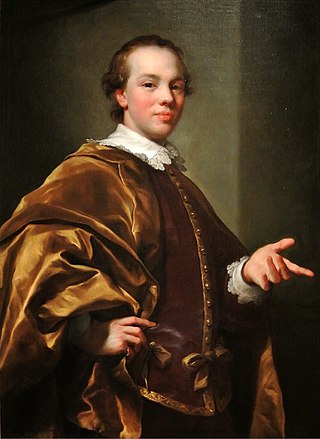
John Stewart, 7th Earl of Galloway,, styled Viscount Garlies from 1747 until 1773, was a British peer who became the 7th Earl of Galloway in 1773 and served as a Member of Parliament from 1761 to 1773.

Charles Brownlow, 1st Baron Lurgan PC, was an Anglo-Irish politician who sat in the House of Commons from 1818 to 1832, during which time he recanted his Orange Order opposition to Catholic emancipation. He was raised to the peerage in 1839.
References
- ↑ Lundy, Darryl (22 December 2007). "Captain Hampden Evans".[ unreliable source ]
- 1 2 Burke, John; Burke, John Bernard (1847). Burke's genealogical and heraldic history of the landed gentry, Volume 1. London: Henry Coulburn. p. 384. Retrieved 12 June 2010.
- ↑ Belfast Newsletter . 21 June 1834.
{{cite news}}: Missing or empty|title=(help) - ↑ "Anti-Tory Association". Belfast Newsletter . 28 November 1834.
- 1 2 3 "Death of the Right Hon. George Evans". Freeman's Journal . 4 July 1842.
- ↑ "Death of the Right Hon. G. Evans". Morning Chronicle . 6 July 1842.
- ↑ "Portrane tower heads for 160th birthday". Fingal Independent. 12 September 2003.